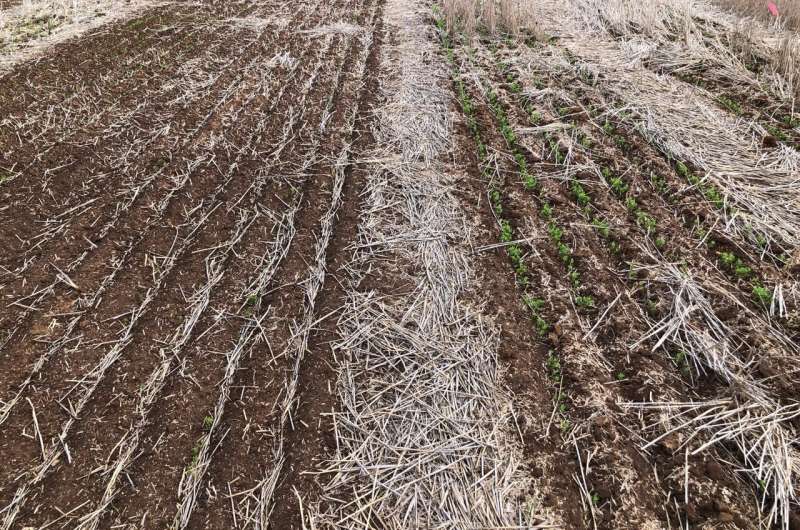Digging deep – Discovering the value of the soil microbiome


Comparison of cultivated and non-cultivated plots. Photo credit: PIRSA SARDI
Researchers in southern Australia are intensively studying the history of soil biology in their state in order to better understand how the soil microbiome works and thus ensure sustainable large-scale agriculture in the future.
A new article in Advances in agronomy aims to raise awareness of the importance of soil biology in agricultural systems, particularly in light of past practices.
Study leader Dr Andong Shi, senior research officer in the agronomy group at the South Australian Research and Development Institute (SARDI), along with colleagues from the University of Adelaide and Flinders University, say it is critical to understand the impacts of past changes in land management practices on current farming systems to help improve future systems.
“The aim of the article is to raise awareness of the importance of soil biology in agricultural systems, as it is often ignored, especially compared to traditional soil analysis, where chemical and physical properties are often measured and monitored,” says Dr. Shi.
“We hope that by learning from the past, we can leverage the benefits of soil microorganisms in sustainable agricultural practices to increase soil fertility, reduce the ecological footprint, and maintain or increase crop productivity.”
The soil microbiome is a collective term that includes all microorganisms present in the soil, whether living or dead, as well as their metabolic products and genetic material in the immediate vicinity.
This study is part of a larger soil microbiome project entitled ‘Past, present and future drivers of soil change’, led by SARDI’s Associate Professor Rhiannon Schilling, along with Associate Professor Stuart Roy and Dr Krista Sumby from the University of Adelaide, and Professor Timothy Cavagnaro from Flinders University.
The project also involves the Birchip Cropping Group in Victoria, Kalyx Australia in Western Australia and the Thomas Elder Institute.
A central objective of the study is to determine whether the diversity and composition of soil communities from past agricultural systems differ from those of present-day agricultural systems.
To investigate this, soil DNA samples collected on farms in southern Australia over the past 20 years were analyzed.
The aim is to assess changes in the soil microbiome as management practices for large-scale cropping are developed in the agricultural zone of South Australia.
“Our soil management has a direct impact on how the soil microbiome functions,” adds Dr. Shi. “Management practices alter the food source, water availability and accessibility, and protection of the soil microbiome.”
“The changes in these elements subsequently have a repercussions on the entire soil ecosystem.”
“The way we manage the soil therefore reflects how healthy the soil ecosystem is, how well it functions and how productive and sustainable it will be for the production of crops and pasture in the future.”
More information:
Andong Shi et al., Chapter Three: Impacts of agricultural management on the soil microbiome: A South Australian perspective on large-scale dryland areas, Advances in agronomy (2024). DOI: 10.1016/bs.agron.2024.02.008. www.sciencedirect.com/science/ … 0065211324000324?via%3Dihub
Provided by SARDI (South Australian Research and Development Institute)
Quote: Dig deep – the value of the soil microbiome revealed (July 10, 2024), accessed July 10, 2024 from https://phys.org/news/2024-07-deep-soil-microbiome-unearthed.html
This document is subject to copyright. Except for the purposes of private study or research, no part of it may be reproduced without written permission. The contents are for information purposes only.



